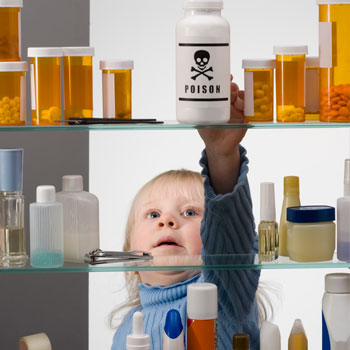Poisonings In Children – Which Household Products Are Hazardous?

As parents, we do our best to keep our children healthy and safe. We buckle up their seatbelts, tell them to wash their hands before dinner, and to eat their fruits and vegetables. Yet, childhood poisonings occur every day across the globe. According to Safe Kids Worldwide, one hundred children ages fourteen and under died in 2002 because of accidental poisonings. Fifty-seven percent of these deaths occurred in children ages four and under. Safe Kids Worldwide also reports that in 2003, 89,330 children ages fourteen and under had to visit a hospital emergency room for accidental poisonings. Eighty percent were children ages four and under.
If you think that an accidental poisoning could not happen to your child, think again. I turned my back on my 18-month-old daughter to throw away her diaper. When I turned around, she had zinc oxide cream in her mouth. She had been out of my sight for less than fifteen seconds! Fortunately, the Poison Control Center said that this cream was not toxic to her.
When my children were babies, I was well aware of the dangers posed by ingesting household cleaners. I had spent four weeks working on a burn unit when I was a university student. I had vivid memories of meeting a child with a chemical burn to the esophagus (the tube that leads from the mouth to the stomach). This burn had been caused by ingesting dishwasher detergent.
Fortunately, many parents do lock up their household cleaners. However, I have learned that we need to keep more than just cleaners away from our children. Here is a list of some of the everyday products that can be severely harmful or poisonous: – all cosmetics and skin care products – toothpaste and mouthwash – antiperspirant and deodorant – shampoo and conditioner, hairspray, and other styling aids – soap and body wash – sunscreen – perfume and cologne – bubble bath – hand and body lotion – baby oil – air freshener and deodorizer – medications – disinfectants – laundry detergents, stain removers, fabric softeners, chlorine bleach, spray starch – dishwashing soap and dishwasher detergent – multi-purpose cleaner – toilet bowl cleaner – furniture polish – batteries – toxic plants – mothballs
In summary, we do everything we can to keep our children safe. However, many products in our homes can poison them. By being aware of products that can cause harm to our children, we can take action to prevent childhood tragedies.
Kimberly Gingras is a work-at-home mom of two young children. She uses only non-toxic household and personal care products in order to prevent accidental poisonings of her children. For more information on non-toxic products for your home OR a FREE E-BOOK, go to http://research.HealthyHomeTour.com
Article Source: Parenting Article Library

